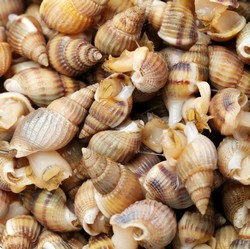Global environmental change disrupts marine life interactions
Ocean acidification, global warming and overfishing are some of the stressors that threaten ocean ecosystems. Marine life forms an important part of human economies and diet, yet the combined effects of environmental stressors remain poorly understood. The GLOBEF (The impacts of global environmental change for marine biotic interactions and ecosystem functioning) study was initiated to improve our knowledge of climate and non-climate stressors on marine life. Stressors investigated include changes in temperature and carbon dioxide pressure (pCO2). In a simulated ocean environment, researchers studied stressor effects on the sea snail, or whelk, known as Nucella lapillus. They found that an increase in pCO2 increased the whelk's metabolic demand yet decreased its feeding rate, leading to slower growth and reduced fitness. In another whelk species, Hexaplex trunculus, there was a reduction in the number of females in the population and a reduction in reproductive success. In contrast, increases in pCO2 and temperature encouraged the growth of algae and seagrass that form the basis of marine food webs. The stressors affect how these plants are consumed, as well as their chemistry, creating a ripple effect along the entire food chain. The project also found that the combination of increased temperature and pCO2 generally led to stronger positive or negative effects then when organisms were only subjected to a single stressor. Moreover, it found that warming and/or ocean acidification alters the physiological responses of marine species, affecting competitive behaviour such as predator-prey dynamics and plant-herbivore interactions. GLOBEF moreover linked environmental variables to the ecological structure and standing stock of kelp forests, demonstrating as well regional scale differences in kelp forest structure linked to temperature. In addition, it showed that key ecosystem engineers with limited dispersal ability are as vulnerable to warming at their range centre as at their range edge. Lastly, the project helped outline marine heatwaves and ascertained their increased frequency and duration, highlighting ecological impacts. The results of this investigation indicate that a combination of global environmental changes has far-reaching consequences on ocean ecosystems. Only through understanding these effects can adaptation and management strategies be created.







